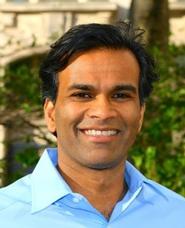
Harvard professor Sendhil Mullainathan, a leading economist in the field of behavioral economics and co-author of Scarcity: Why Having Too Little Means So Much, will present a lecture on Thursday, Oct. 23, at 7:30 p.m., in the Chapel. The lecture, sponsored by the Levitt Center and supported by the Continental Fund, is free and open to the public.
Mullainathan and co-author Princeton cognitive psychologist Professor Eldar Shafir examine the psychology of scarcity and the scarcity mindset that narrows perspective and perpetuates lack through the limiting of one’s options. This is an important new work that addresses the psychology around poverty and how people’s minds work differently when they feel they lack something. The results of their research show empirically that the feeling of scarcity places very real limits on what people are able to see, and the authors offer strategic interventions as behavioral solutions to help break these cycles that lead to the scarcity mindset.
Mullainathan’s work runs a wide gamut: the impact of poverty on mental bandwidth; whether CEO pay is excessive; using fictitious resumes to measure discrimination; and showing that higher cigarette taxes makes smokers happier. His latest research focuses on using machine learning and data mining techniques to better understand human behavior.
He helped co-found a non-profit to apply behavioral science (ideas42), co-founded a center to promote the use of randomized control trials in development (the Abdul Latif Jameel Poverty Action Lab), serves on the board of the MacArthur Foundation, and has worked in government in various roles, including most recently as assistant director of research at the Consumer Financial Protection Bureau.
A recipient of the MacArthur “genius” Award, Mullainathan has been designated a “Young Global Leader” by the World Economic Forum, labeled a “Top 100 Thinker” by Foreign Policy Magazine, and named to the “Smart List: 50 people who will change the world” by Wired Magazine (UK). He writes regularly for The New York Times.
This lecture is the second in the Levitt speaker series that aims to support Hamilton’s growing commitment to social innovation. The speaker series is focused on educating the community about the many different ways that practitioners and academics can contribute to addressing persistent social problems in an effective, ethical and sustainable manner. The series will consist of well-known speakers focused on one of each of the divisions of the College: the Arts, Humanities, Sciences and Social Sciences.
